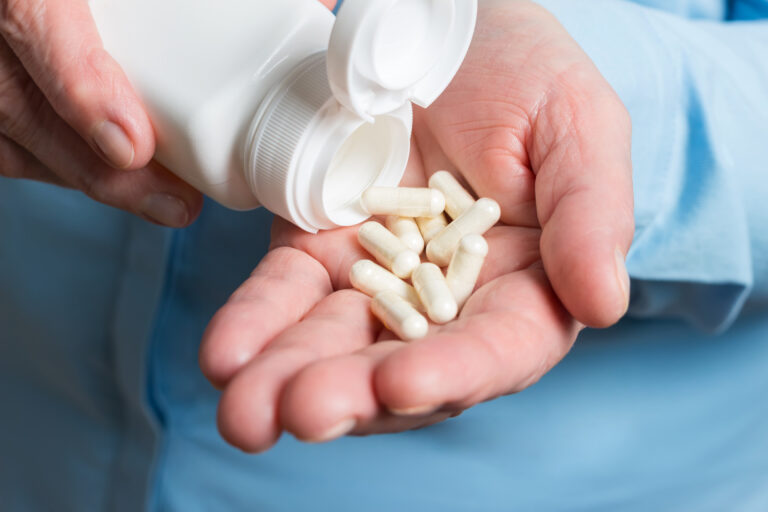Glucosamine and Physical Activity
Glucosamine and Physical Activity
High levels of physical activity may increase risk for joint injury due to repetitive movements of force and rotation. A compound that could address both prevention of future joint injury and repair of existing issues would be particularly helpful for those participating in high impact exercise, where joint injuries can affect one’s ability to participate in the short term and have consequences for degenerative processes in the long term. A cartilage component called glucosamine may be part of the solution.
The joints of the human skeleton are a complex combination of cartilage, ligaments, tendons, membranes, and fluids, and they are classified based on structure and function. Synovial joints allow for the most movement, followed by cartilaginous joints and fibrous joints. Synovial joints contain articular cartilage: a combination of water, proteoglycans, collagen, and other proteins – which provide a smooth surface for low-friction movement and a cushion for load bearing activities.
Osteoarthritis and Joint Health
Osteoarthritis involves damage and breakdown of articular cartilage, resulting in joint pain and inflammation. The breakdown can occur over time as one ages, but sustaining an injury early in life can lay the foundation for accelerated degeneration. One prospective study demonstrated that the relative risk of having osteoarthritis in the knee by age 65 was increased three-fold in those who experienced a knee injury during adolescence or young adulthood.1
Glucosamine is a building block of the proteoglycans found in cartilage. It is also harvested from shellfish and used as an oral supplement. Oral supplementation of glucosamine has been studied for its ability to prevent breakdown of cartilage over time, maintain the rate of cartilage synthesis, and restore cartilage after damage has occurred. Ongoing studies are looking at various dosing strategies for the best effect.
Glucosamine Research
Glucosamine studies in humans have shown mixed results. However, the results of animal studies have been intriguingly positive. One of the differences between these types of studies is the dosage. Historically, most human studies have relied on dosage levels at which effects seem to be at a tipping point (generally 1500 mg per day), while animal studies have used doses that maximize plasma concentrations.2 Multiple studies have now shown that positive effects of glucosamine supplementation increase in a dose-dependent manner, which could account for study inconsistencies.3
Protective Effects of Glucosamine
The ability of glucosamine to protect cartilage was studied through a randomized, double-blind, placebo-controlled study of soccer players using type II collagen metabolism as the study marker. Type II collagen is a major component of cartilage and is used as a biomarker for the breakdown and synthesis of the cartilage matrix. After 16 weeks of oral supplementation with 2000 mg per day of glucosamine, subjects showed suppressed type II collagen degradation while maintaining type II collagen synthesis, indicating a role for glucosamine in protecting and maintaining cartilage in healthy athletes.4 No adverse changes in any anthropometric, biochemical, or clinical markers were reported during or after the study period.
Similarly, a study that compared 1500 mg per day versus 3000 mg per day of glucosamine in soccer and rugby athletes found a dose-dependent reduction in the ratio of cartilage degradation to cartilage synthesis, with the ratio decreasing from 0.15 to 0.10 in the 3000 mg per day group after three months. The group consuming 1500 mg per day also experienced a reduction in the ratio of cartilage degradation to cartilage synthesis, but it was much smaller.5
Recovery Effects of Glucosamine
An important role for glucosamine in recovery from joint injury has also been demonstrated. One randomized, double-blind, parallel trial using 1500 mg per day of oral glucosamine or placebo followed 106 patients with acute knee injuries for 28 days, assessing pain, function, and swelling. After 28 days of treatment, the patients in the glucosamine group demonstrated significant improvement in knee flexion and extension as compared to the placebo group.6 A reduction in recovery time is key for reducing an athlete’s time away from training and competition and could potentially increase their competitive longevity in their sport.
Slowed Progression of Joint Degeneration
There is also preliminary evidence that glucosamine can be effective in slowing joint degeneration after it begins. A randomized, placebo-controlled trial was conducted to determine the efficacy of treatment with 1500 mg per day of glucosamine sulfate in preventing the progression of osteoarthritis of the knee in 202 patients over the course of three years. Over the course of the study, the average change in joint space width worsened in the placebo group but not in the experimental glucosamine group.8 Joint space width is an indication of disease progression in osteoarthritis.7 In addition to differences in joint space width, there was significant symptom improvement and improved osteophyte score (an indicator of bone spur severity) in the glucosamine group versus placebo (though osteophyte score was a secondary finding and not a primary outcome measure for the study).8
Building, maintaining, and recovering healthy joint function are all imperative steps for sustaining a lifetime of healthy exercise habits and remaining active in the years that follow. Evidence for the effectiveness of glucosamine supplementation in affecting these joint parameters is encouraging and should be considered when developing a supplementation protocol for high levels of physical activity. Glucosamine should be avoided in those with shellfish allergies, but the evidence for overall safety of glucosamine is strong.9
- Gelber AC, Hochberg MC, Mead LA, Wang NY, Wigley FM, Klag MJ. Joint injury in young adults and risk for subsequent knee and hip osteoarthritis. Ann Intern Med. 2000;133(5):321-328. doi:10.7326/0003-4819-133-5-200009050-00007
- McCarty MF, O’Keefe JH, DiNicolantonio JJ. Glucosamine for the Treatment of Osteoarthritis: The Time Has Come for Higher-Dose Trials. Journal of dietary supplements. 2019;16(2):179-192. doi:10.1080/19390211.2018.1448920
- Patel, Kamal, Glucosamine. com. 2019, Aug 14. Retrieved from: https://examine.com/supplements/glucosamine/research/#inflammation-and-joint-health_interventions-restricted-to-athletes
- Tsuruta A, Horiike T, Yoshimura M, Nagaoka I. Evaluation of the effect of the administration of a glucosamine‑containing supplement on biomarkers for cartilage metabolism in soccer players: A randomized double‑blind placebo‑controlled study. Mol Med Rep. 2018;18(4):3941-3948. doi:10.3892/mmr.2018.9396
- Nagaoka I, Tsuruta A, Yoshimura M. Chondroprotective action of glucosamine, a chitosan monomer, on the joint health of athletes. Int J Biol Macromol. 2019;132:795-800. doi:10.1016/j.ijbiomac.2019.03.234
- Ostojic SM, Arsic M, Prodanovic S, Vukovic J, Zlatanovic M. Glucosamine administration in athletes: effects on recovery of acute knee injury. Res Sports Med. 2007;15(2):113-124. doi:10.1080/15438620701405248Beattie KA, Duryea J, Pui M, et al. Minimum joint space width and tibial cartilage morphology in the knees of healthy individuals: a cross-sectional study. BMC Musculoskelet Disord. 2008;9:119. Published 2008 Sep 8. doi:10.1186/1471-2474-9-119
- Pavelká K, Gatterová J, Olejarová M, Machacek S, Giacovelli G, Rovati LC. Glucosamine Sulfate Use and Delay of Progression of Knee Osteoarthritis: A 3-Year, Randomized, Placebo-Controlled, Double-blind Study. Arch Intern Med.2002;162(18):2113–2123. doi:10.1001/archinte.162.18.2113
- Zhu X, Sang L, Wu D, Rong J, Jiang L. Effectiveness and safety of glucosamine and chondroitin for the treatment of osteoarthritis: a meta-analysis of randomized controlled trials. J Orthop Surg Res. 2018;13(1):170. Published 2018 Jul 6. doi:10.1186/s13018-018-0871-5







